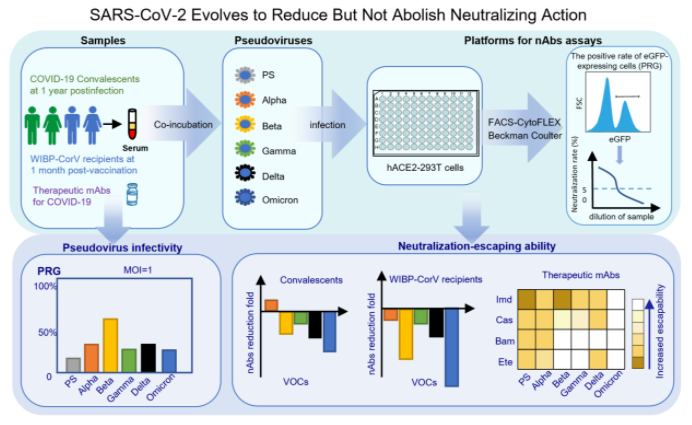In October 2022, Prof. FAN Xionglin's team from the School of Basic Medicine published a research paper entitled "SARS- CoV-2 evolves to reduce but not abolish neutralizing action" in theJournal of Medical Virus. The worldwide pandemic of severe acute respiratory syndrome coronavirus-2 (SARS-CoV-2) and its disease coronavirus disease 2019 (COVID-19) has lasted more than 2 years, seriously threatening global public health and economic development.To conquer the pandemic, at least 16 vaccines and 9 monoclonal antibodies (mAbs) have been developed based on the spike protein (S) of the SARS-CoV-2 prototype strain (PS) and approved for vaccination or treatment at unprecedented rates. The impression that the pandemic will end soon is starting to emerge, and public health interventions have been even liberalized in an increasing number of countries and regions. Neutralizing antibodies (nAbs) play decisive roles in preventing reinfection and underscoring clinical COVID-19 disease progression. Variants of concern (VOCs) have resulted in subsequent waves of pandemics, such as B.1.1.7 (Alpha), B.1.617.2 (Delta), B.1.1.529 (Omicron), and the latest emerging Omicron sublineages BA.2.12.1, BA.4, and BA.5. Evidently, there is an urgent need to update current control measures for pandemics caused by these VOCs and future potential variants.
Prof. FAN Xionglin's team has been paying close attention to the variation ofSARS-CoV-2 and its escape ability to immunity since the epidemic. In the study, Human angiotensin-converting enzyme 2 (hACE2)-293T cells were constructed by stably expressing the hACE2 receptor on the surface of HEK293T cell lines (Genomeditech). On this basis, a pseudovirus neutralization assay platforms was established, and serum samples from 65 convalescent patients and 20 patients who completed the basic immunization program of two doses of inactivated vaccine and four therapeutic monoclonal antibodies were detected, the neutralizing effect of different pseudoviruses and the infectivity of different pseudoviruses to HEK293 cell lines overexpressing HACE2 receptor were compared.

The study demonstrated that newly emerging and pandemic variants enhance infectivity and exhibit a strong ability to escape these nAb responses during the pandemic. Among these variants, Omicron appears to be the most resistant to neutralization by both serum and mAbs. The evolution of Omicron is achieved by mutating based on existing favorable mutations to gain stronger immune escape ability during theCOVID-19 pandemic. It is predicted that the virus will evolve and break through the immune barrier established by infection or vaccination. Therefore, global surveillance of new viral variants, early identification and quarantine of infected individuals, and development of more effective vaccines are important measures to control the COVID-19 pandemic.
